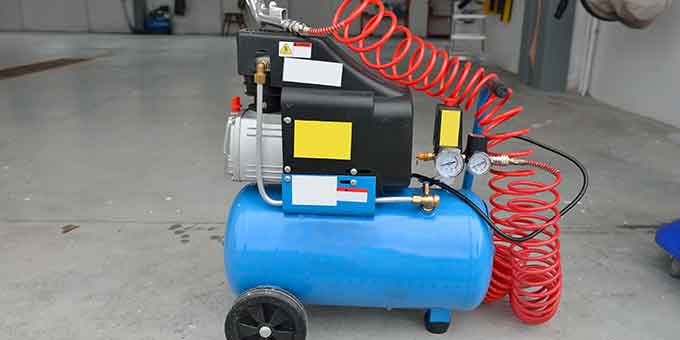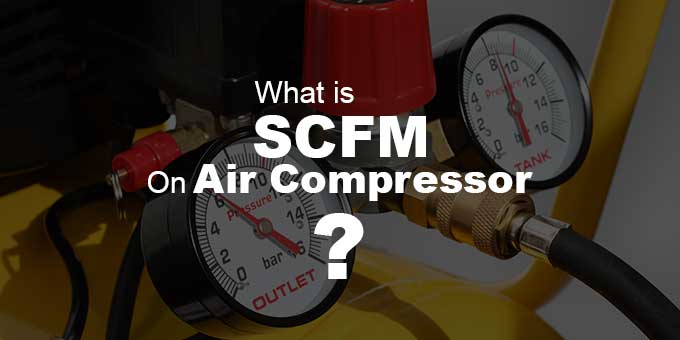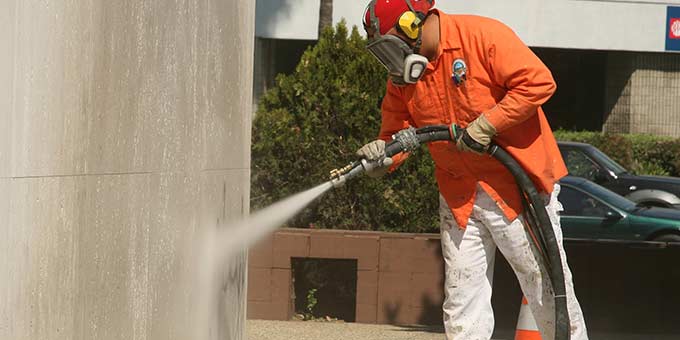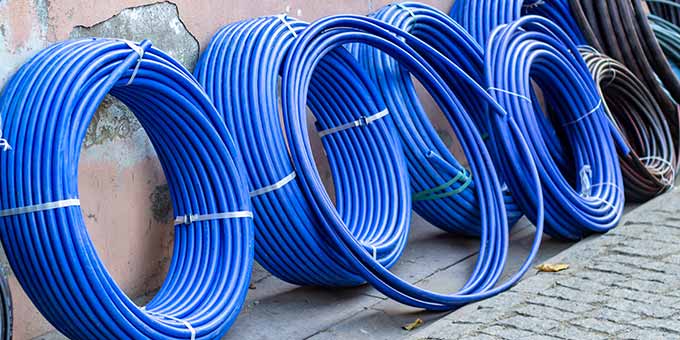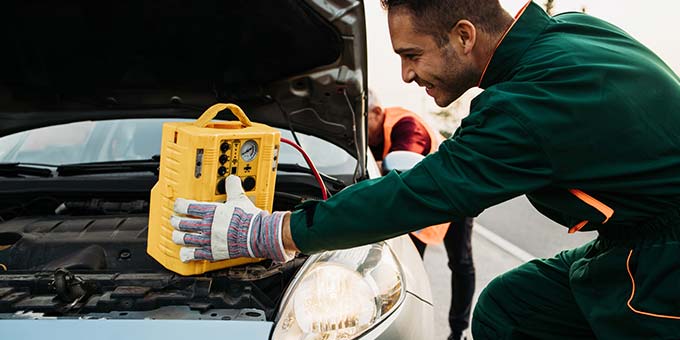While storing your air compressor outside may help you save space indoors, exposing your compressor to the elements can cause both short and long-term damage, so before you head outdoors to find a new home for your air compressor, here is what you should know.
Factors to Consider Before Storing Air Compressors Outdoors
Unlike mini air compressors, a traditional compressed air system can be bulky and take up considerable space in your garage, but before you take your air compressor outside, here are three factors to consider.
The Climate
Air compressors function optimally at temperatures of 50 degrees Fahrenheit and above. Cold temperatures can put a strain on your compressed air system, prompting it to malfunction, which costs money. It can also damage your air dryers and crack the heat exchangers. In really cold climates, storing your device inside is more or less a requirement. This is to prevent parts such as the automatic drainage system, control valves, and pipes from freezing.

The reality is that rotary screw compressors are not designed to be housed or utilized in cold temps below 34 degrees Fahrenheit. Although your synthetic compressor oil will not frost, the compressor’s condensate, which is primarily made up of water, is vulnerable to freezing in cold weather.
Condensate can freeze everywhere it accumulates, including on or in your air compressor and its controls, causing the system to malfunction. Some air compressors can be equipped with a cold-weather kit to allow them to function in cold temperatures.
Moisture
Moisture is a compressor’s worst enemy. It’s essential to safeguard your equipment from rain and snow if you want it to last. Your air tools may become corroded over time if there is moisture in your compressor. Water can also affect spraying finishes and paintwork, depending on what you’re doing with your equipment. Therefore, it is advisable to store your air compressor inside in an area where moisture cannot get into it. To prevent a buildup of moisture in your compressor, you can use a compressed air dryer or a water separator.
A Buildup of Dirt and Debris
Compressors require clean air in order to function optimally. The cleaner the air that your air compressor draws in, the better its function and durability. When you store your air compressor outdoors, there is a greater chance of dirt and dust particles in the air being drawn into the device when it is operational. By letting unclean air from the outside in and causing it to work more to acquire air, you can cause damage to your compressor pump. It is essential to check your filters on a regular basis and replace them if there is a significant accumulation of dust and grime.
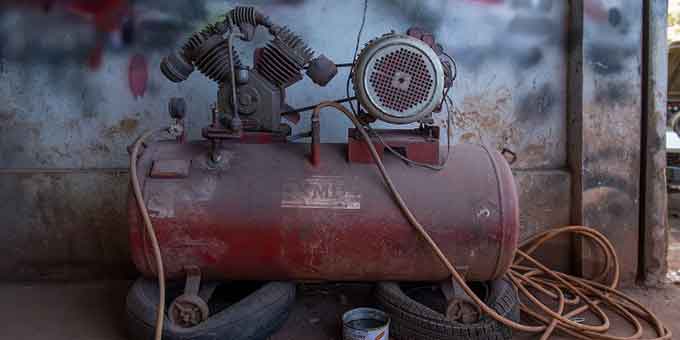
Relocating your compressor outdoors is possible, but it puts your operation and your equipment at risk of danger. If you choose to put it outdoors, ensure that it is properly insulated and covered to prevent dirt from accumulating on the compressor’s surfaces.
How to Properly Store Your Compressed Air System
To prevent damage and ensure that your air compressor functions well and gives you several years of good service, you must understand how to store it correctly. You may have issues if you store your compressor outdoors but use it indoors. Here are a few helpful hints for preserving your air compressor by storing it well.
Prepare Your Storage Space
Because dirt and moisture can cause severe damage to parts such as the compressor pump, it is essential that you store it indoors in a place that is free of dirt and moisture. Dust and particulates can attach to lubricating fluids and cause the motor to become worn out, so ensure that you clean it well by dusting it before storing it.
The area you choose for storing your air compressor should also be free from direct sunlight and should have an ambient temperature of around 50 degrees Fahrenheit. If you are storing batteries for battery-powered compressors, be sure to never store them in temperatures exceeding 100 degrees Fahrenheit or in direct sunlight. Be sure to check the area regularly to ensure that there is no moisture. Clean and dust it regularly.
Turn Your Air Compressors Off Before Storing Them
To begin preparing an air compressor for storage, turn it off. Reduce the air pressure in the device using the regulator knob until it reaches zero. Next, disconnect the compressor from its power source. If you have a battery-powered compressor, switch it off and carefully remove its batteries, which should be placed in a suitably dry, clean location with at least 40 percent of charge remaining. Disconnect any pneumatic tools or air hoses connected to the compressor after it has been unplugged or the battery has been removed.
Drain the Compressor
Finally, it’s critical to remove any leftover liquids from the air compressor that can create corrosion if left behind. Put a drainage pan below the valve of your compressor. To discharge the liquid, partially open the valve and drain the liquid into the pan. Since residual air may emerge under high pressure, ensure that you are wearing gloves. Additionally, keep your hands away from direct contact with the liquid. We recommend getting someone else to assist you with this.
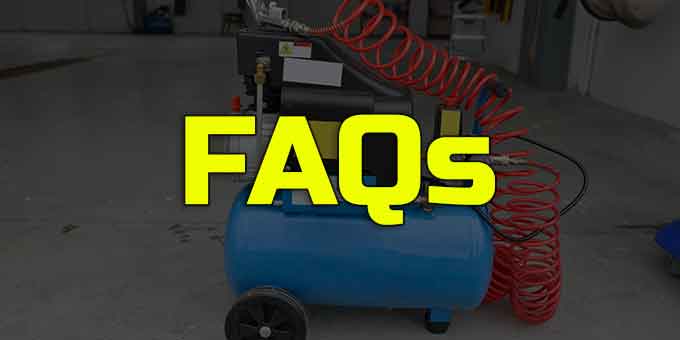
Frequently Asked Questions (FAQs)
In the section below, we answer some of your most pressing questions, including questions like “Will my compressor work in cold weather?” and “Can you leave a compressor in an unheated garage?”
1. Will a Compressor Work in Cold Weather?
As mentioned previously, temperatures under 40 to 45 degrees Fahrenheit are not recommended for air compressors. Therefore, it is essential to check the temperatures in the storage space you set aside for your compressor in the winter.
As a result, knowing how to manage the space properly is critical to ensuring that the unit operates at optimal efficiency. If left uncontrolled, the condensation created by an air compressor might freeze, causing damage to components such as the compressor pump. With that being said, compressors are unlikely to break down over the winter. Still, they require extra care and efforts to keep them warm enough to avoid freezing and causing irreversible damage to any components.
Before running your compressor in the winter, it is essential that you check to see that none of the components have frozen and that there is no damage to the device. Frozen moisture in the compressor can block the drain valve and cause cold hoses, so you must drain condensate daily, especially if you experience freezing temperatures where you live.
2. Can You Leave a Compressor in an Unheated Garage?
Yes, you can store your air compressor in an unheated garage, provided that it isn’t oil-filled and that the garage is sufficiently insulated to prevent temperatures from dropping too low. Be sure to drain your compressor after each use and keep it clean by dusting regularly.
3. How Do I Keep My Compressor Warm in the Winter?
We have a few helpful tips if you are looking for ways to keep your device warm to prevent frozen condensate from damaging internal filters and other components.
Use a Heater
You can inquire about a cold-weather kit for your air compressor by contacting the supplier. If there is no kit available, you could simply purchase a heater and set it near the compressor. Be sure to place it far enough to prevent a fire. This will be the most efficient solution in a contained area, such as a shed.
Be Mindful of the Electrical Cords
Special care must be taken with the electrical cords that feed the unit. Ensure that they aren’t left unprotected on the floor where they could be run over or damaged. It is preferable to conceal them or suspend them above the device.
Ensure That the Compressor and the Hoses Are at the Same Temperature
Several people overlook the hoses when storing their compressors. The truth is that condensation can easily form in the heated region as air travels from a hotter to a colder temperature. This results in the condensate freezing as it reaches the cold hoses. The frozen condensate then causes clogs. To prevent this, we recommend using an air dryer.
Warm the Unit Before You Use It
If you store the compressor outdoors and then move it indoors to use it, it’s a good idea to let it warm up for a few hours before switching it on. You should do this because frozen moisture may still be present in the components and allowing it to warm up can melt some of that liquid.
Drain the unit after it has been sitting at room temperature for a bit. This process is also important since the quick temperature shift can cause extra frost to accumulate. To prevent moisture buildup, discharge the compressor on a daily basis.
Final Thoughts
In order to prolong the lifespan of your air compressor, it is essential that you store it correctly. While storing outside may save you space, it can cause serious damage to the compressed air system. Be sure to follow the tips mentioned in this article to store your air compressor correctly. If you need help choosing the right air compressor, check out our buying guide.


